Man vs machine. How AI is going to replace humans. AI will take my job—the top titles when you google "how will chatGPT change copywriting?".
And it's understandable; AI is an unknown. Faced with the unknown, humans turn hypervigilant. There's nothing new about this; evolution has likely made our brains react this way to help us survive. When uncertainty meant confronting a predator, being hypervigilant meant the difference between life and death.
Today, our fear of uncertainty is less about us being killed and more about us being made redundant, obsolete, defunct—chatGPT will take away our jobs and livelihood, and we will become enslaved by machines.
Accept it won't, and we won't.
Will chatGPT replace copywriters?
It’s true that AI will likely kill off those who refuse to use it. But for those of us who choose to embrace it, AI will make us better writers. It will push us to be more creative and write in ways that have, until now, not been possible.
The future of copywriting will not involve copywriters being replaced by AI. Instead, writers will work collaboratively with AI to create more personised content that helps drive revenue. AI writing is smart writing.
Here are five use cases for AI copywriting—and the reasons AI won't replace writers.
1. AI helps writers brainstorm
Writing should be (at least) a three-step process. We brainstorm, we write a first draft, and then we edit.
The first step is possibly the hardest, as it's time-consuming to read every relevant article on a topic and find enough expert opinions to write insightful content.
AI, however, can help streamline the process. Instead of starting with a blank page, tools such as chatGPT can provide us with a roadmap of potentially relevant topics.
For example, as part of an initial brainstorming session for a recent article on future supply chain predictions, I knew that digitisation and the environment would be significant. But I did not have five or six robust points to help define a structure and carry out further research.
So I asked chatGPT. And it gave me eight points. 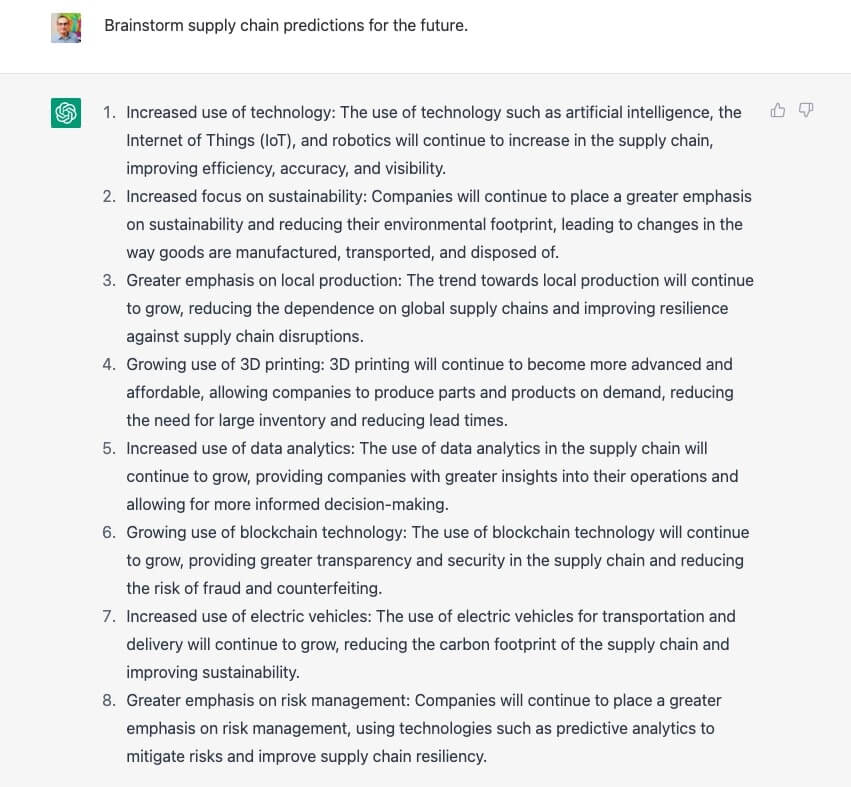
From these eight points, I could create an outline for a blog provisionally titled 5 future supply chain predictions.
ChatGPT helped with the topic, but I needed to delve deeper to write authoritatively on individual points. For example, to show how blockchain technology has the potential to change supply chains and to provide relevant real-world examples, I needed to include and reference points from articles such as Blockchain In Supply Chain by Forbes.
2. AI helps writers carry out keyword research
Together with brainstorming, keyword research is one of the first tasks a writer undertakes. This gives them an understanding of what people are looking for online and the questions they are asking.
There are several ways of doing this, including simply guessing key search terms and running them through software such as MOZ or SEMrush to find a more precise keyword or phrase.
However, AI can help by giving the writer somewhere to start. Wanting to write about a supply chain-related topic, I asked chatGPT what the highest volume keyword search terms are.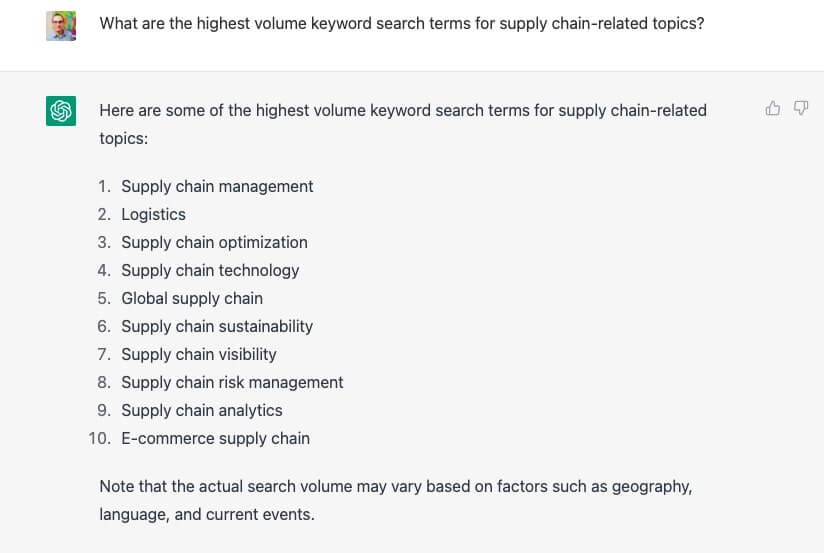
Instantly, I have ten relevant topics to run through keyword software. It is unlikely that I will directly use any AI-generated keywords. There are better, more precise long-tail keywords that resonate more with my target audience and their search intent, but AI-generated keywords are a good place to start. They could also give me ideas that I may never have previously considered.
As chatGPT warns, there are many other factors at play with keyword research, such as where your audience is located and recent events—so the writer needs to balance AI-related suggestions with their knowledge of the topic and the world.
3. AI helps writers research complex topics
Copywriters have to write as if they are experts—because they are often ghostwriting for experts. This requires extensive research on complex topics. For example, when writing a blog on when a contract manufacturer should use hard tooling vs soft tooling, the writer first must understand these manufacturing methods. Traditional google search can be a lengthy and hit-and-miss process.
However, asking an AI tool—such as chatGPT—the question produces a high-level overview of the topic in seconds.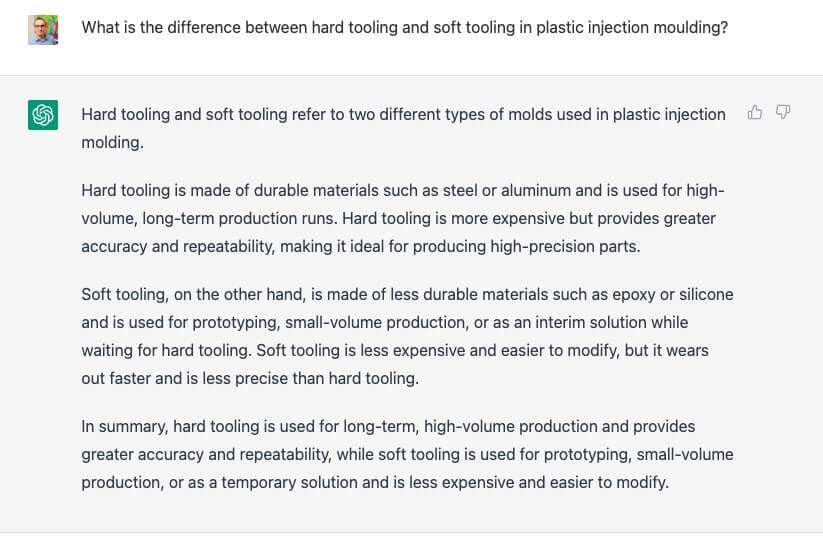 For a blog on the benefits of hard tooling vs soft tooling, this is a great place to start.
For a blog on the benefits of hard tooling vs soft tooling, this is a great place to start.
The information above is an introduction to help the writer find and research different topics.
For instance, ChatGPT tells us that soft tooling is used for prototyping and low-volume production, which gives the writer direction. But it is only through extensive research and speaking to experts that I discovered that the most cutting-edge method of producing prototypes and low-volume production is through MUD tooling—which I then used AI to define. AI helps writers quickly understand complex topics and synthesise information. It does not write the content for them. Writers have experience and understand how to present information in a way that will resonate with a target audience at the right moment.
AI helps writers quickly understand complex topics and synthesise information. It does not write the content for them. Writers have experience and understand how to present information in a way that will resonate with a target audience at the right moment.
4. AI helps writers gain insights into their target audience
Writers need to understand, empathise with, and speak directly to their audience.
Without insight into their audience, a written product is unlikely to be effective—which is why we write to a specific buyer persona and not a general audience.
Although we have a target audience in mind before writing, gaining as many insights as possible into what is essential for this person is vital. Of course, face-to-face questioning is the best method; however, AI can help by rapidly providing information.
Here are some key issues suggested by chatGPT for a medical device developer as the target audience.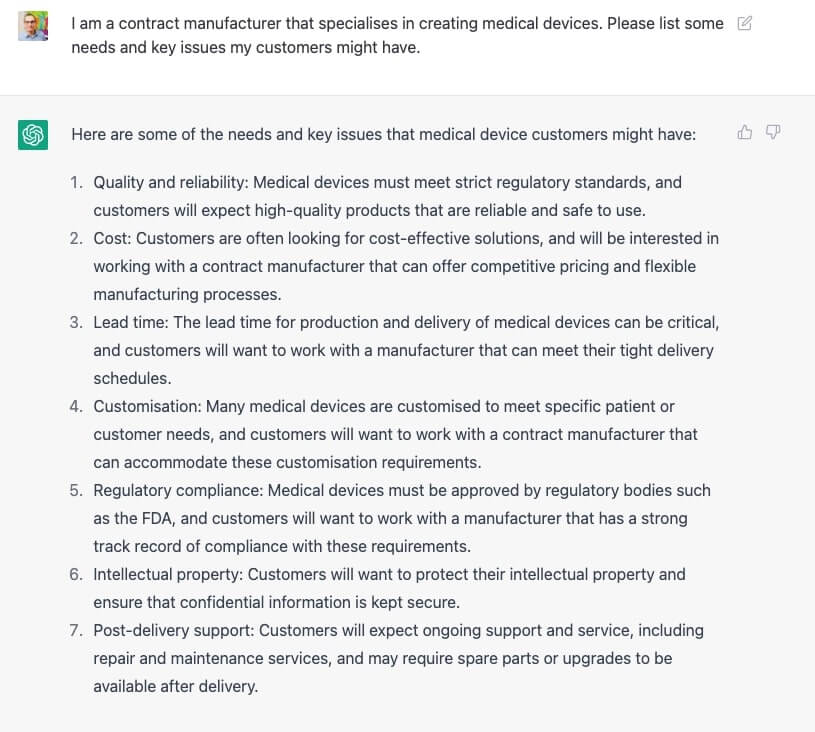 This information is helpful for two main reasons. It can help to plan content and create topic clusters, and it can also help function as the foundation of an interview plan. The above is an excellent outline for an interview with a subject matter expert.
This information is helpful for two main reasons. It can help to plan content and create topic clusters, and it can also help function as the foundation of an interview plan. The above is an excellent outline for an interview with a subject matter expert.
5. AI helps writers by summarising long-form content
Writers have to consume huge amounts of content to inform their work. However, reading everything that might be useful is far too time-consuming.
For example, in a recent blog on manufacturing medical devices for the brain, I identified the article “Deep brain stimulation", written by an Oxford University researcher, as containing potentially helpful information. Adding a summary of the article would be impactful and provide an interesting perspective. But, at nearly 4,000 words, I had no time to read and summarise the entire article.
However, ChatGPT provided a summary in seconds.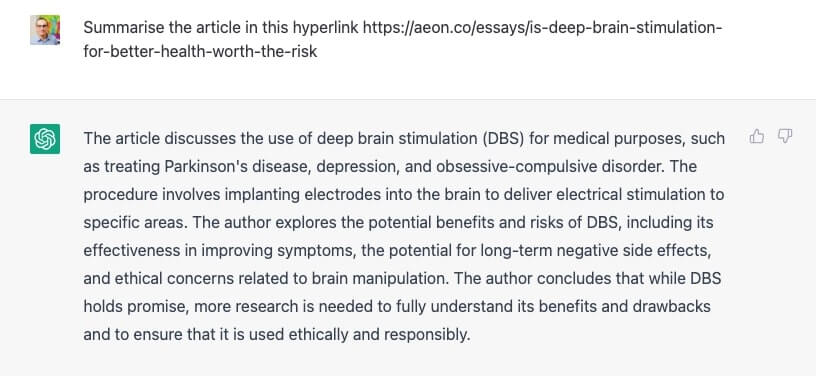
While not a replacement for serious research, AI allows the writer to reach new levels and include information that would otherwise be impossible to include due to time constraints.
6. AI helps writers draft titles
A title is generally the first and last thing you write: first because it will define the blog's structure, and last because the structure will probably have morphed into something different after the blog is complete.
AI can help to create the first of these tiles. 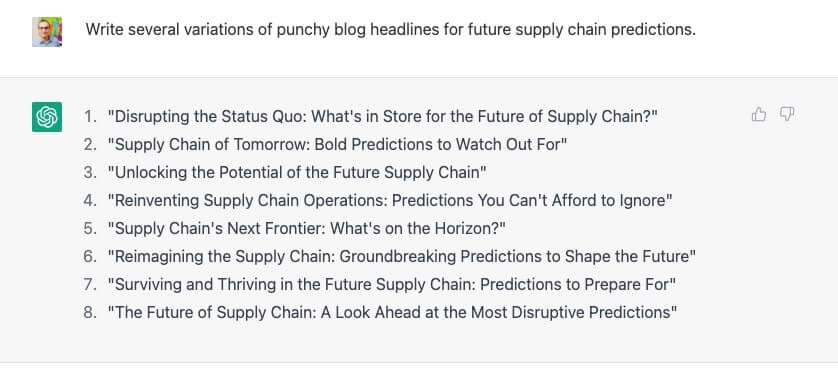 The above titles are a good start. They are not optimised for SEO, but they work as draft titles. It's easy to spend far too much time refining a title at the beginning, only to completely change it after writing the whole blog. However, using ChatGPT, you can save time in the beginning and then spend more time crafting the perfect final title.
The above titles are a good start. They are not optimised for SEO, but they work as draft titles. It's easy to spend far too much time refining a title at the beginning, only to completely change it after writing the whole blog. However, using ChatGPT, you can save time in the beginning and then spend more time crafting the perfect final title.
Conclusion
I'm not sure I agree entirely with Sundar Pichai, CEO of Alphabet and Google, when he said that AI is a more important invention than fire—but it will likely have a massive impact on human history. And just like early humans didn't shun fire, I'm not planning on shunning AI (I don't think any writer should).
The key is to know how to use the tool—and to do so ethically. Some people will use AI to write entire pieces of content because they can—which is a mistake. However, the smart writer will leverage it to write more creative, well-informed, compelling content that delivers even better ROI.


